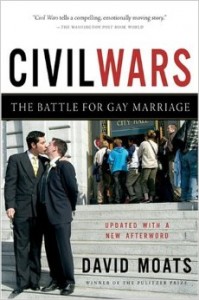 Civil Wars: A Battle for Gay Marriage
Civil Wars: A Battle for Gay Marriage
by David Moats
Harcourt. 288 pages, $25.
CIVIL WARS is a chronological account of Vermont’s landmark adoption of a law mandating civil unions in December 1999. As editorial page editor for the Rutland Herald, Moats wrote a series of articles that focused on the 1999 Vermont Supreme Court decision that found the state’s law denying marriage to gays and lesbians to be discriminatory. These articles won him a Pulitzer Prize.
While paying his due to abstruse legal matters invoked by the case of Baker v. State of Vermont, David Moats gives much credit for the victory to a Vermont tradition of civility and good manners. “[H]atred was countered by an instinct toward neighborliness and courtesy,” the author observes. In Civil Wars, Moats connects this civility to the fact that Vermont was the first state to outlaw slavery, a fact that’s repeated throughout the book.
And yet, comparing gay civil unions to the emancipation of slaves seems a bit of hyperbole—and not the only case of it. “The world shifted on December 20, 1999 [the day the Vermont Supreme Court advocated for a revised marriage law],” House member Bill Lippert asserts, ignoring the fact that other countries, such as the Netherlands and Belgium, were already well on their way to full marriage. For Lippert, as well as for many Vermonters, the state was embarking on a thoroughly novel idea.
Language is a key concern in the discussion, with Moats emphasizing how much legislative caviling surrounded the phrase “civil union” and its relation to “marriage.” Moats sees the debate as more semantic than substantive: “People solemnized a marriage. They would certify a civil union.” Concentrating on the nuts-and-bolts of how the “civil union” compromise came about, he does a good job of showing why it was so important that all three branches of government—the legislature, the courts, and Governor Howard Dean—were involved in the discussions for and against civil unions.
At other times, the author’s prose waxes a little too rhapsodic for the otherwise sober tone of the book: “Eventually, as the case unfolded, America would get a lesson in the nature of freedom, the meaning of family, and the capacity of democracy to bend with the winds of change in order to accommodate the demands of human dignity.” It is also problematic that Moats chose to take Stonewall as the starting point of the gay and lesbian rights movement, thus neglecting the many significant advances in gay and lesbian rights that occurred before 1969.
Moats’s decision to subtitle his book “A Battle for Gay Marriage” is a shrewd one, reflecting his awareness that the events in Vermont were part of a much larger ongoing discourse. Toward the conclusion of the book, he addresses this historical reality, observing that “Vermont had stood on the shoulders of Hawaii [and now]Massachusetts would stand on the shoulders of Vermont.” Civil Wars is a vital text whose conviction it is that when the issue of gay marriage is resolved, this debate will be regarded as an instructive chapter in the history of liberation.
________________________________________________________
Chris Bell is a writer living in Chicago.





